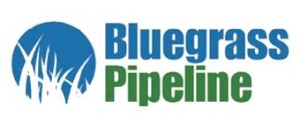Bluegrass Pipeline reps defend project at monthly chamber luncheon
By JIM BROOKS
Nelson County Gazette
 Thursday, March 6, 2014, 2 p.m. — Representatives of the Bluegrass Pipeline faced a packed house at the Bardstown Country Club for the Bardstown-Nelson County Chamber of Commerce’s monthly luncheon.
Thursday, March 6, 2014, 2 p.m. — Representatives of the Bluegrass Pipeline faced a packed house at the Bardstown Country Club for the Bardstown-Nelson County Chamber of Commerce’s monthly luncheon.
Scott Carney, representing the pipeline’s partners, Boardwalk Pipeline Partners and the Williams company, presented a talk and slide show detailing the Bluegrass Pipeline project and its impact on Nelson County.
Safe, efficient transportation of energy “is tantamount to our standard of living,” Carney told the group. Pipelines are the most economical and safest way to transport energy.
Domestic production of crude oil and natural gas has increased tremendously in the past decade, and by 2016, the United States is on track to be the largest producer in the world.
The potential profitability of Natural Gas Liquids — the product the Bluegrass Pipeline will carry — has help spur drilling in Pennsylvania and West Virginia shale fields, Carney said.
“We have more energy that we have pipelines,” he said. the Bluegrass Pipeline is part of the narrative to get the NGLs to the Gulf Coast where they are separated.
In response to environmental concerns, Carney told the group they have avoided heavily populated and environmentally sensitive areas. Pipelines are far safter than rail transportation since railroads travel through major population centers.
The partners seeking to build the pipeline are no strangers to building pipelines in karst geology as found in areas of Central Kentucky.
“Kentucky doesn’t have a monopoly on karst geology,” he said, referring to a national map indicated karst areas scatter all over the country. “Running a pipeline through a karst area is nothing new.”
Karst areas will be evaluated as the pipeline is built, and engineers will take steps to insure the pipeline’s integrity, Carney said.
The petrochemicals found in NGLs are the building blocks of modern plastics found throughout our economy, from trash gas to automobile dash boards, he said. Six hundred pounds of each new car is a petrochemical plastic.
At the end of the presentation, Carney did not take questions from the audience, announcing instead he would be free to meet with individuals with questions. Several members of the audience spoke with Carney regarding the potential hazards of a pipeline break and the impact on drinking water supplies.
Mary Drake was waiting to question Carney regarding the tax revenue figures the company was using in its promotion of the pipeline. In a list of questions she carried with her, Drake questioned the accuracy of the pipeline partner’s tax revenue figure of $2.7 million for Nelson County alone.
When asked if she owned property along the proposed route, Drake said she was there “because I like to have good drinking water,” a concern expressed by others in attendance.
Carney assured those he talked to that safety is paramount in the construction and maintenance of the pipeline.
-30-






